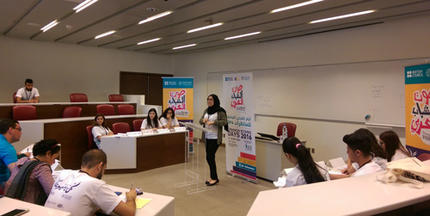Strong LAU debating team wins at Young Arab Voices finals
LAU’s group joins eleven debating teams from universities and youth movements throughout Lebanon.

One of five LAU team members who prepared for and won in the final debates against AUB and Balamand, Lea Fakih delivers an argument in front of an impartial panel of judges.
A team of five representing LAU at the Young Arab Voices debate finals recently held clinches first place, following months of rigorous training.
Eleven debating teams from universities and youth movements throughout Lebanon participated in the initiative, sponsored by the British Council and the Anna Lindt Foundation and replicated since 2011 in various Arab countries. “Debate can solve the lack of communication among people in our region. As debaters, we learn first to listen well and critically evaluate an argument,” says LAU student and MEPI TL scholar Safea AlTef, a member of the winning team.
Among the instructors were LAU Associate Professors at the department of English, Dany Badran and Victor Khachan, who formed part of a group of three trainers who initially held an intensive three-day session for ten local trainers, before delivering, separately, regular training workshops to three or four of the 11 debate teams, each comprising up to 24 members who completed the training and participated in in-house debates between December and May. Each institution then selected its strongest five debaters to represent it and compete in the finals, arguing in either English or Arabic.
“I really enjoy witnessing the rapid development in their reasoning and personalities,” says Badran of his trainees. “They become better listeners, sharper and faster thinkers, their ideas clearer and more structured, and their delivery more impactful.”
In addition to evidence and reasoning, and organizing and responding to arguments, Badran and his fellow trainers taught the debaters how to coordinate and work as a team. “That whole pressure within only a 30-minute window was very stressful, and if it weren’t for the bond that we created, we would have clashed and not been able to win,” says LAU debate team member Christie Maike, referring to the fact that despite researching five topics and motions, the teams were only informed half an hour before the debates which two motions they would be debating and which side of each motion they would be arguing.
The winning LAU team, one of three arguing in English, squared off against Balamand University, defending the motion that inter-ministerial coordination in Lebanon will help increase job opportunities for Lebanese youth; and against AUB, opposing the motion to put a stop to the marriage of girls under the age of 18 in Lebanon.
“Sometimes we are required to take a stand against our own values. It allows us to consider all ideas and opinions, and evaluate and understand the other. This is a first step towards healthy communication in the region,” says AlTef.
Lea Fakih agrees. “During debates you have to put aside your beliefs and try to understand another perspective; and that’s something that everyone needs, especially in Lebanon because of our strongly held beliefs that we think will never change.”
According to Maike, “when politicians come up on TV shows, they always end up arguing in a very disrespectful manner, sometimes violently assaulting each other instead of actively listening to others’ points of view and diplomatically and logically refuting their argument. It is in our culture to get angry and take things personally. The beauty of the Young Arab Voices program is that it is targeted toward youth and for youth, as only future generations can change the current culture.”
Congratulations to Safea AlTef, Christie Maike, Lea Fakih, Farah Al Mashharawi and Mohamad Timtaoucine, who formed the LAU debate team that represented the university in the Young Arab Voices final debates against AUB and Balamand and won.
Read more about the Young Arab Voices initiative at http://www.youngarabvoices.org/about
More
Latest Stories
- LAU Kicks off the Seventh Season of the Jr. NBA League
- Bridging Policy, Science and Society to Tackle Lebanon’s Environmental Challenges
- Understanding a Core Security Gap in Drone Operations
- LAU’s AKSOB Hosts a Timely Debate on Digital Banking and the Future of Finance
- LAU Study Maps Antibiotic Resistance in Lebanese Wastewater
- LAU Builds New Bridges to Lifelong Learning
- Monitoring Poverty in a Data-Deprived Environment
- Alumna Lynn Nasr (BArch ’25) Shortlisted Among the World’s Top Architecture Graduates

